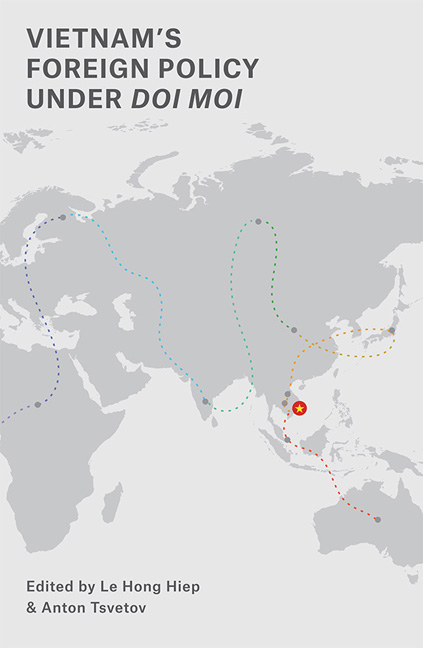Book contents
- Frontmatter
- Contents
- List of Tables
- List of Figures
- List of Abbreviations
- Acknowledgements
- About the Contributors
- PART I ANALYTICAL AND HISTORICAL FRAMEWORK
- PART II BILATERAL RELATIONSHIPS
- 3 The Evolution of Strategic Trust in Vietnam–U.S. Relations
- 4 The 2014 Oil Rig Crisis and its Implications for Vietnam–China Relations
- 5 Vietnam–Japan Relations: Moving beyond Economic Cooperation?
- 6 The Reinvigoration of India–Vietnam Partnership under Prime Minister Modi
- 7 Vietnam–Russia Relations: Glorious Past, Uncertain Future
- 8 Vietnam's Foreign Policy Towards its Smaller Neighbours
- 9 Vietnam's Decision to Join ASEAN: The South China Sea Disputes Connection
- PART III MAJOR FOREIGN POLICY ISSUES
- Index
7 - Vietnam–Russia Relations: Glorious Past, Uncertain Future
from PART II - BILATERAL RELATIONSHIPS
Published online by Cambridge University Press: 04 July 2018
- Frontmatter
- Contents
- List of Tables
- List of Figures
- List of Abbreviations
- Acknowledgements
- About the Contributors
- PART I ANALYTICAL AND HISTORICAL FRAMEWORK
- PART II BILATERAL RELATIONSHIPS
- 3 The Evolution of Strategic Trust in Vietnam–U.S. Relations
- 4 The 2014 Oil Rig Crisis and its Implications for Vietnam–China Relations
- 5 Vietnam–Japan Relations: Moving beyond Economic Cooperation?
- 6 The Reinvigoration of India–Vietnam Partnership under Prime Minister Modi
- 7 Vietnam–Russia Relations: Glorious Past, Uncertain Future
- 8 Vietnam's Foreign Policy Towards its Smaller Neighbours
- 9 Vietnam's Decision to Join ASEAN: The South China Sea Disputes Connection
- PART III MAJOR FOREIGN POLICY ISSUES
- Index
Summary
Out of Vietnam's multiple major partners, Russia is perhaps the most ambiguous in terms of strategic value to Vietnam's current foreign strategy. The rich history of bilateral relations has created a profound basis for the current partnership, but apart from several traditional spheres of cooperation, Russia–Vietnam ties have not seen many breakthroughs in recent times. Moreover, as Vietnam develops its relations with various powers such as China, the United States, Japan, India, South Korea, Australia and the European Union (EU), whether Russia can play a key role in Vietnam's foreign policy in the long run remains an open question.
After the Ukraine crisis broke out, Russia has seen its relations with the United States and European states deteriorate. This has provided Russia with new incentives to intensify its relations with Asia-Pacific countries (Lo 2014). While China has been the focus of such efforts (Gabuev 2015), the Russian leadership also acknowledges the need for diversification. Japan and South Korea, albeit important partners for Moscow, are both U.S. treaty allies, which creates impediments for Russia's diplomatic manoeuvring. Against this backdrop, Vietnam, as an increasingly important economic and strategic player in the region, has emerged as a promising target of Moscow's “pivot to Asia”.
This chapter examines Russia–Vietnam relations, their recent history, contemporary state and future prospects. The first section reviews the historical ties between Russia's predecessor, the Union of Soviet Socialist Republics (USSR), and Vietnam. The section accordingly examines how the bilateral Cold War ties have shaped certain aspects of Vietnam's current relations with Russia. The second section looks into the modern Russia–Vietnam relations, starting from Vladimir Putin's third presidency in 2012. Finally, the third section analyses how the substance of this partnership fits into the broader foreign policy of Russia and Vietnam, as well as its future prospects.
- Type
- Chapter
- Information
- Vietnam's Foreign Policy under Doi Moi , pp. 141 - 165Publisher: ISEAS–Yusof Ishak InstitutePrint publication year: 2018

